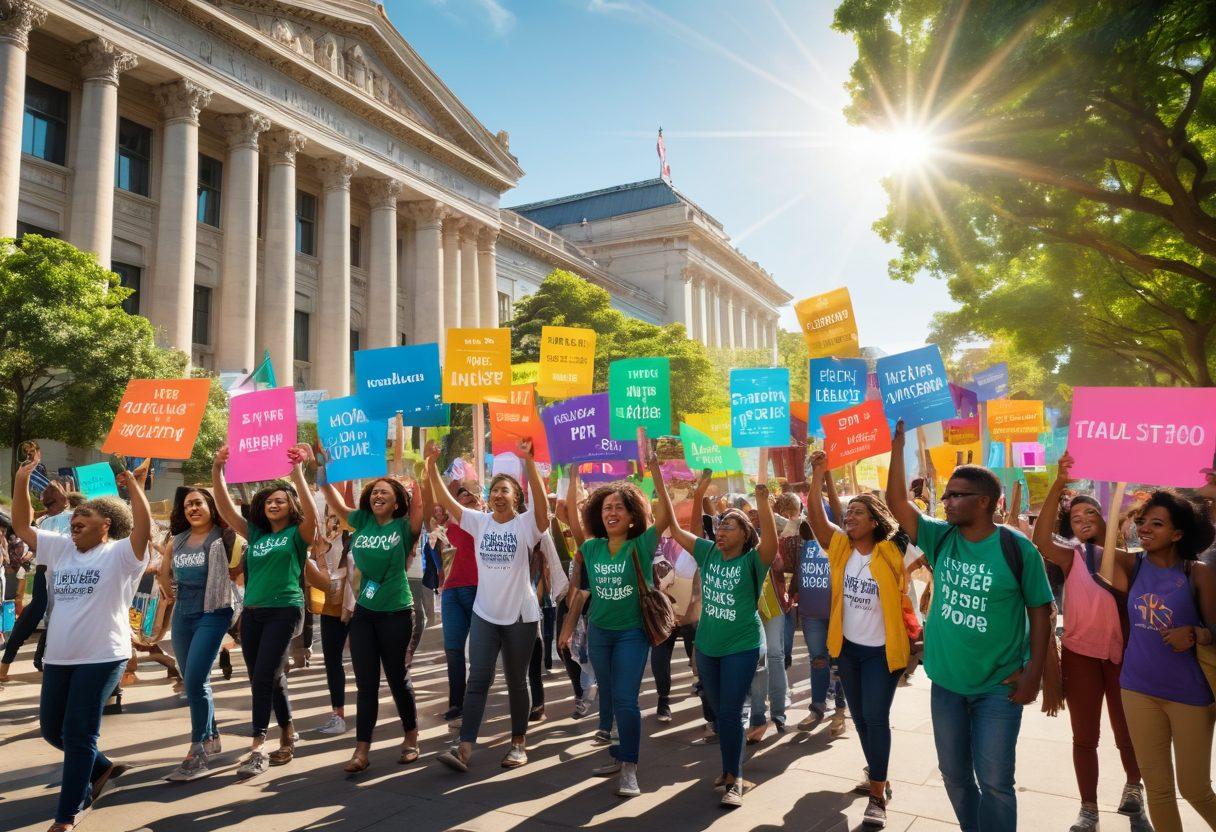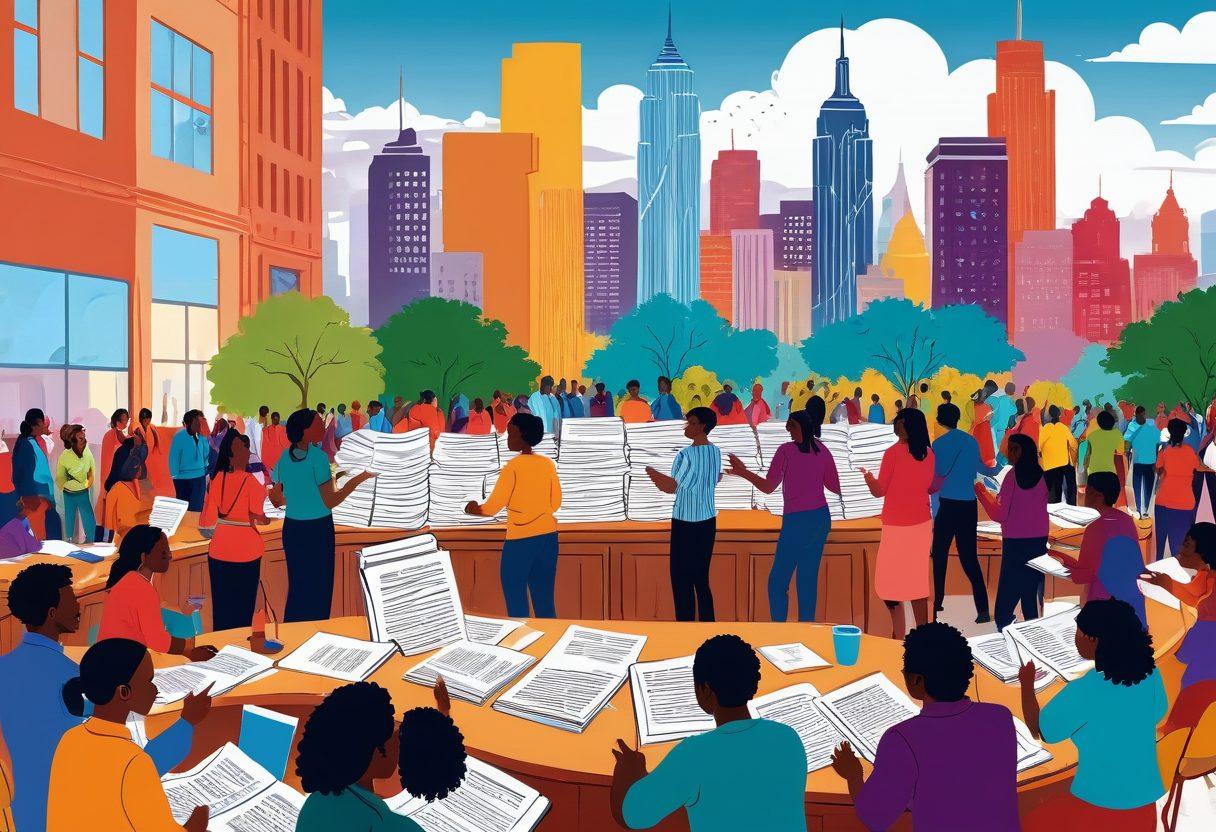Empowering Communities: The Role of Advocacy Groups in Shaping Legislative Processes for Social Justice
In today’s ever-evolving political landscape, advocacy groups have emerged as powerful catalysts for grassroots change. They serve as the voice for those who feel underrepresented, shaping the legislative process through tireless efforts in community engagement. Ask yourself: how often do we hear the stories of those who have fought for their rights, paving the way towards social justice and equality? Advocacy groups are often the unsung heroes in these narratives. Through collective action and organized campaigns, they bring about critical policy reform while ensuring that the legal framework surrounding civil rights is upheld and enhanced.
Imagine a community grappling with issues of injustice, systemic inequities, and a lack of essential government resources. In walks a nonprofit organization, ready to create ripples of change. This is the essence of advocacy groups at work—harnessing grassroots voices and transforming them into a unified call for action. With their leadership, communities access legal assistance and legal education, empowering individuals with the knowledge they need to navigate complex public administration systems. The quote, "Never doubt that a small group of thoughtful, committed citizens can change the world; indeed, it's the only thing that ever has," encapsulates the enduring impact of dedicated advocacy.
Advocacy groups excel at building coalitions that span diverse demographics, enabling them to represent the needs and aspirations of a broad range of constituents. This is evident during legislative advocacy efforts, where they engage with lawmakers, provide insights, and mobilize constituents to influence the legislative process. They strategically use data and personal stories to highlight the need for rights protection and support for marginalized communities. When was the last time you felt inspired by the power of collective voices to impact public policy? The stories of change resonating from the work of advocacy groups remind us that each voice matters, and together, they can spark substantial shifts in society.
However, the journey toward change is not without its challenges. Advocacy groups often grapple with bureaucratic hurdles and resistance from those invested in maintaining the status quo of law and order. Yet, history showcases the resilience of these organizations. They adapt, innovate, and push forward, refusing to be deterred. Their resolve is a lesson in determination. How can we support these groups in their noble mission? By amplifying their efforts, whether through volunteering, donations, or simply spreading awareness about their vital work in community development, we become part of a larger movement for justice.
Ultimately, advocacy groups are more than just collectives; they embody the spirit of social justice. They challenge existing policies, educate communities about their rights, and push for meaningful change that resonates at all levels of government relations. As we reflect on the transformative power of grassroots activism, let it inspire us to engage, advocate, and rally for a future where everyone enjoys equal rights and opportunities. Our actions, no matter how small, contribute to a common goal of equality—reminding us that in the world of advocacy, the journey may be long, but the destination is always worth striving for.
From Legal Aid to Legislative Advocacy: Empowering Communities for Social Justice
In the pursuit of social justice, the role of advocacy groups cannot be overstated. These organizations act as the frontline warriors for communities, fighting for the rights and needs of those who often go unheard. But how do these grassroots movements evolve from offering legal aid to engaging in legislative advocacy? By understanding the intricacies of the legislative process, advocacy groups empower communities, enabling them to not just survive but thrive within a robust legal framework that champions civil rights. After all, as the saying goes, 'Justice delayed is justice denied.' What would it look like if every voice counted in the halls of power?
Imagine a community where every individual has access to legal assistance, where legal education is prioritized, and where government resources are allocated fairly to nurture community development. Advocacy groups play a critical role in this vision, but they do more than provide immediate help—they also work to reshape the public policy landscape. Through legislative advocacy, these nonprofit organizations not only tackle pressing issues but also advocate for policy reform that addresses systemic inequities. This multifaceted approach reminds us that social justice is not merely a destination; it is an ongoing journey fueled by consistent community engagement and persistence.
Increasingly, advocacy groups are stepping into the realm of public administration to ensure that the voices of marginalized populations are recognized. They do this by forging strong government relations, educating the public about their rights, and navigating the often convoluted channels of the legislative process. They remind us of the power of grassroots movements. Who would've thought that a small local nonprofit organization could influence major reforms in law and order? In a world filled with challenges, their stories are not just inspiring; they are proof that every effort matters.
Take, for instance, the success of advocacy groups in advancing human rights. When the government proposed legislation that would disproportionately affect a vulnerable community, advocates organized protests, rallied public support, and engaged lawmakers in meaningful dialogue. The result? The proposed bill was amended to reflect the community's concerns, illustrating that when people come together, they can enact real change. So, what strategies can communities adopt to empower themselves in this legislative landscape?
Ultimately, it all boils down to community empowerment. To shape legislative processes for social justice, individuals must be informed and organized. It means educating oneself about the legal framework governing rights protection, understanding how policy reform works, and forming coalitions that amplify community voices. The question then becomes: how can each of us contribute to a more equitable society? By getting involved, attending local meetings, or supporting advocacy groups, we can play a significant part in this ever-evolving story of social justice. Let's empower one another to fight for a brighter future!
Building a Just Society: The Crucial Role of Nonprofits in Legislative Processes
In today's world, where social justice often feels like an elusive goal, nonprofits play an essential role in bridging the gap between communities and the government. With the continuous evolution of the legislative process, communities can no longer afford to sit on the sidelines. Advocacy groups, through the tireless efforts of dedicated activists and legal professionals, are staunch defenders of civil rights and social justice. How can these organizations transform communities and influence public policy decisively? Let's delve into the crucial role nonprofits play in shaping legislative advocacy and building a just society.
Imagine a community overwhelmed by the complexities of legal aid and legal assistance, where citizens feel alienated from the decision-making processes that impact their lives. Nonprofits step in as powerful allies, offering legal education and guidance to empower individuals. This proactive involvement not only fosters community engagement but also drives efforts towards policy reform. As a quote wisely reminds us, 'The greatest gift of democracy is the right to participate,' and nonprofits ensure that every voice is heard in the corridors of power.
Through strategic government relations, advocacy groups skillfully navigate the labyrinth of public administration, turning government resources into vital support for their communities. They act as a bridge, connecting ordinary citizens with the legal frameworks that uphold their rights. By facilitating dialogue between community members and policymakers, these organizations ensure that the needs and concerns of the community are prioritized. The key question here is: How can enhanced collaboration lead to a more robust legal framework for rights protection?
It’s fascinating to see how nonprofits are not merely reactive entities but also proactive change-makers. From advocating for law and order to standing firm in the fight for human rights, these organizations are at the forefront of community development. Their efforts in legislative advocacy not only highlight social injustices but also propose tangible solutions that can reshape the society we live in. Can you imagine the impact of a united community, fighting for their rights together? The potential is limitless.
In conclusion, nonprofits play an irreplaceable role in the journey toward a more just society. By embracing the power of advocacy groups, communities can engage in the legislative process more effectively and insist on meaningful change. The partnership between citizens and these organizations lights a path forward where social justice is not a distant dream but a concrete reality. So, let's champion these advocacy efforts and work together to nurture a society where every individual is empowered to claim their rights.


